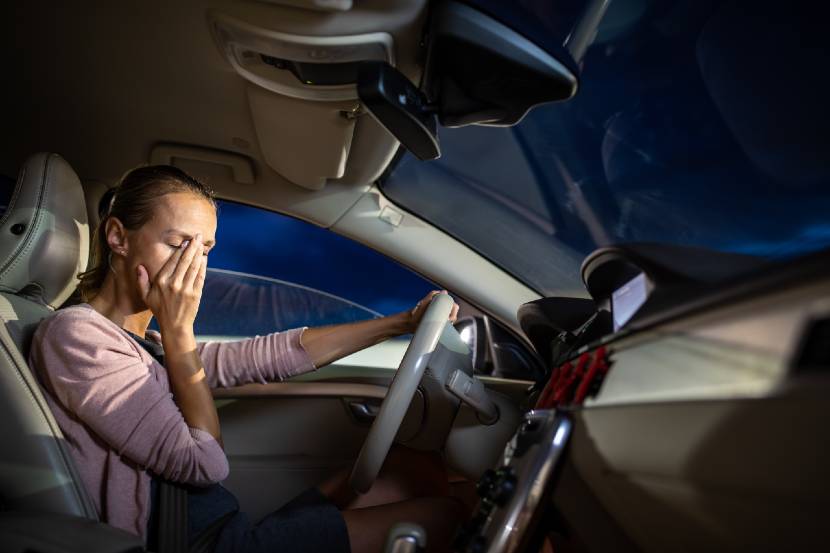Road safety charity Brake, says that 1 in 8 drivers admit to falling asleep at the wheel. Now, a new test pioneered by the Australian government’s Office of Road Safety could test drivers' blood for signs of fatigue. We look at why this could be brought in and how it could work.

Why should drivers be prosecuted for driving if they’re tired?
Brake has found that globally, 10-20% of crashes are caused by drivers who were asleep behind the wheel.
And nearly 2 in 5 (37%) of UK drivers have been so tired they were scared they’d fall asleep at the wheel, according to Road Safety Scotland.
The report from Road Safety Scotland goes on to say that driving on less than 5 hours of sleep is as dangerous as drink-driving. In fact, if you fall asleep while driving at 70 mph, you could travel 200 metres and not realise it. So it’s clear something needs to be done to prosecute sleepy drivers.
Professor Clare Anderson from Monash University in Melbourne, who has helped to create the new blood test, said:
“When you look at the major killers on the road, alcohol is one of them, speeding is another, and fatigue is one of them. But even though the solution to fatigue is quite simple, which is to get more sleep, our capacity to manage it is impaired because we don’t have tools to be able to monitor it like we do with alcohol.”
Are there any tests that currently look for driver fatigue?
There aren’t any tests for tired drivers at the moment. This means that if there’s a crash, it’s difficult to find out if the cause was driver fatigue.
It’s up to the driver to admit this, or the police use evidence from the scene.
For example, they’d look at the type of impact. Usually drivers who've fallen asleep at the wheel are travelling at high speed. Tired drivers don’t brake either, so there aren't usually any tyre skid marks on the road.
The police would also look at how long the driver was driving for, their lifestyle and any eye witnesses.
Even with this evidence, it’s difficult to determine for sure that the cause of an accident was driver fatigue. That’s why sleep experts are calling for more regulation so tired drivers can be prosecuted if they cause an accident.
What could the new test do?
The test detects biomarkers in the blood. These are molecules that show an abnormal process, in this case sleep deprivation.
When tested, the biomarkers in the blood show when someone has been awake for 24 hours or more. The test boasts a 90% accuracy rate.
If authorities decide to use the test, they’d probably test the blood after an accident to see if tiredness was the cause.
Anderson goes on to say:
“[These biomarkers] are really strongly related to how long somebody’s been awake, and they’re consistent across individuals. Some of them are lipids, some of them are produced in the gut, so they’re from different parts of the body – which is interesting, because sleep is implicated in a number of different health problems.
“But they're not metabolites that are involved in things like caffeine or anxiety or adrenaline, which could be affected if somebody has been involved in a motor vehicle crash.”
The test could eventually be done alongside drug and alcohol tests after an accident.
Could this test help to enforce laws on sleepy drivers?
Yes, these tests can help to enforce the law on tired driving. But they could also help set a legal limit for sleep and driving - a bit like the drink-drive limit.
Dr Madeline Sprajcer, a sleep researcher at Central Queensland University in Wayville, Australia said:
“Based on our meta-analysis, it appears that between 4 and 5 hours of sleep would be a reasonable place to draw that line in the sand.[...] Below about 5 hours of sleep is where we also see an approximate doubling of the risk when compared with well-rested individuals.”
At the moment, a driver who has killed someone because of fatigue can be charged with death by dangerous driving or careless driving. The maximum penalty is a prison sentence of 14 years.
When will the new test be ready?
The new test could be ready within 2 years. The Australian government’s Office of Road Safety is also looking into portable roadside tests, but these could take 5 years.
What are the reasons for driver fatigue?
Here are some common reasons why drivers might be fatigued:
- Lack of sleep or broken sleep.
- Stress.
- Irregular sleep patterns.
- Driving for long periods.
- Vehicle engineering. New vehicles can be quiet and comfortable, so drivers relax more.
- Taking medication while driving
- Time of day. At 2 am - 6 am and 2 pm - 4 pm your body clock reaches a natural dip, causing drowsiness.
- Monotonous road environments and lack of driver stimulation. Most accidents happen on motorways and dual carriageways because of this.
What our motor insurance expert says
“There are lots of reasons why drivers might feel tired behind the wheel. For instance, those who spend most of their working day on the road, or those taking unusually long trips. But taking steps to reduce the risk of driving while tired can help make the roads safer for all road users. And the introduction of potential roadside blood tests are also a positive step towards achieving this.
“When driving, doing things like keeping the temperature cool in the car or keeping hydrated can really help. But if you're tired, it's always recommended to take regular breaks or to pull over in a safe place and rest.
“Choosing to drive when tired can have serious consequences. Not only can drivers find it harder to focus, but it's likely they'll have slower reaction times and the possibility of falling asleep behind the wheel. If caught, drivers could be convicted for driving without due care and attention, facing fines of £100 and 3 points on their licence. Our guide on motoring conviction codes will help drivers to understand this offence so that they're aware.”



